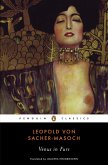In "Venus in Furs," Leopold Ritter von Sacher-Masoch presents a provocative exploration of desire, power dynamics, and gender roles through the lens of sadomasochism. Written in 1870, the novella employs lush, descriptive prose to delve into the psyche of its protagonist, Severin, who becomes enamored with the controlling figure of Wanda. The text illustrates the complexities of love and submission against the backdrop of 19th-century societal norms, intertwining philosophical musings with eroticism, thus paving the way for modern discussions on BDSM. As a cornerstone of the literary tradition often referred to as masochism, the narrative confronts the reader with a nuanced perspective on pleasure and pain, making a significant contribution to the genre of erotic literature that juxtaposes romantic ideals with physical domination. Leopold Ritter von Sacher-Masoch was a central figure in the Viennese literary scene and drew on his own experiences and desires to inform his writing. His exploration of the interplay between sexual pleasure and psychological control reflects his nuanced understanding of human relationships and the societal constraints of his time. Through his works, Sacher-Masoch critiques the norms of masculinity and femininity, revealing the often hidden complexities of desire. I highly recommend "Venus in Furs" to readers interested in the intersections of sexuality, power, and literature. Its enduring relevance and rich thematic depth offer both an enthralling reading experience and significant insights into human behavior and cultural norms. This seminal text not only entertains but also challenges readers to reflect on the nature of pleasure and the intricacies of desire.
Dieser Download kann aus rechtlichen Gründen nur mit Rechnungsadresse in A, B, BG, CY, CZ, D, DK, EW, E, FIN, F, GR, H, IRL, I, LT, L, LR, M, NL, PL, P, R, S, SLO, SK ausgeliefert werden.









